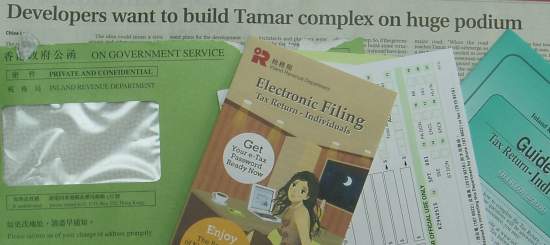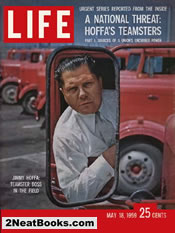


The week gets off to a colouful start, thanks to the arrival at Perpetual Opulence Mansions of a large green envelope, cheerful enough to brighten anyone’s day. Things go rapidly downhill, however, when I pull it from the mailbox. I open it and find a list of impertinent questions about my salary, whether I was married during all or part of the year up to 31 March 2006, and how much I donated to charity. Failure to complete and return the form within one calendar month will result in ‘action’ – men in hoods will break down the door, drag me away in chains, tie me up in the Revenue Tower dungeon and thrust bamboo spikes under my fingernails while forcing me to listen to Kenny G’s Greatest Hits.

As with all things wonderful and irresistible, there is a catch. To file by Internet requires an e-Tax password, which in turn requires some preliminary work on on the website and then days of waiting in suspense while the postal service delivers the magic string of digits to your correspondence address, at which point the recipient leaps up and down in excitement shouting “Yippee, another password to remember!”
I am less than astonished to find that this is all courtesy of ESDlife, the widely neglected Government portal, whose bosses were investigated by anti-corruption officers on suspicion of exaggerating usage of the white e-Lephant. It is owned by Li Ka-shing’s Hutchison, which presumably saw it as the ultimate sort of Cantonese business opportunity – wedge yourself between the Government and the public and take a slice of the action on every transaction. Why do all that difficult value-adding stuff when you can find a nice little bit of effortless rent-seeking?
My suspicions that the benefits of Internet filing are enjoyed mainly by the bureaucrats at the other end are heightened by the fact that everyone doing it gets entered into a lucky draw – the last refuge of a desperate vendor. A lucky draw is an advertisement for a bad product. Are there not records from biblical times about butchers trying to offload shipments of rancid camel meat by offering a chance to win a weekend in Jericho for two? Probably not. But it brings to mind a joke about merchants of animal flesh…
Tue, 16 May


My mind drifts back to the era of China Motor Bus, Darkie toothpaste and itinerant stinky tofu sellers. People knew how to panic properly in those days. As a tropical cyclone approached, frantic grannies, housewives, office fodder and school kids would all charge into Park N Shop, beating each other aside with umbrellas and piling shopping carts high with anything edible, absorbent or cleansing. Within minutes, the shelves would be bare. Nowadays, people send their maids to stock up on essential supplies, and the helpers stand peacefully and quietly in the line at the checkout, as is only fitting 48 hours after several relatives back in your home village have drowned in a mudslide.
Even Hong Kong’s dedicated and expert civil servants can’t always control the weather perfectly, however. Wild American friend Odell, who monitors typhoons as a way of taking his mind off sex, emails me with his personal estimate that the Number 8 signal could go up as early as 2pm tomorrow. If so, Central’s workforce will be faced with two choices. Either stand at bus stops for an hour before starting the journey home, or… “The question is,” the ex-Mormon says, “where will be open? D26 might close – it’s run by Chinese. Hardy’s might open early.” He lists several other possible places in which the city’s pale-skinned inebriates, not wishing to burden the transport system at such a critical time, will be able to find shelter for a few hours. For those whose timing is bad or unlucky, however, retreat to the safety of their homes will become impossible, as the tempest strikes, and torrential rain, uprooted trees and satellite dishes start falling from the skies, tragically forcing them to stay in Lan Kwai Fong all night, contemplating their narrow escape from the horrific forces unleashed by Mother Nature.
Wed, 17 May

On the top floor of S-Meg Tower, all three Stanleys from the mailroom parade into the gwailo’s lair. One places a hefty package on my desk, while the other two produce their music players. The enlightenment of the repentant Cantopop fans continues, as I download the latest mp3 of the week for their aural pleasure. Last week, it was Fairport Convention. Today, I offer them Jefferson Airplane’s Today, a song that is almost mushy enough to be covered by one of Hong Kong’s simpering, mass-produced balladeers. I will slowly wean them onto the more challenging stuff – they will be listening to The Dead Kennedys by the end of summer.
And what is in the envelope? Most curious. It is an invitation to join a supposedly up-market, members-only bar, but it’s really more of an IPO. Members are owner-investors. The bar does not endear itself to me by calling itself M1NT and insisting that it is ‘exclusive’ – a word that always makes me reach for my Luger. Am I supposed to be impressed by the list of members of its London branch? Val Kilmer (never heard of him, or her). Chelsea FC Chairman Bruce Buck (ditto, but sounds excruciatingly tedious). F1 driver Mark Blundell (ditto again, but probably devoid of any personality, if other racing car people are anything to go by. Anyway, he shouldn’t drink). Prince William (is that the retard who dressed as a Nazi? Either way, we are talking about low-IQ genetic material here). Liz Hurley (heard the name, but have no idea what she looks like or does). And Rupert Murdoch’s sons (he in fact gave them names – James and Lachlan. Might be worth a couple of beers).
Those sectors in full – Media, Banking, Fashion, Music, Law, Sport, Medicine, Property, Art and Manufacturing. How will they find 10 people each from Art or Sport in a city that doesn’t do those things? And what about Agriculture and Fisheries? Also conspicuous by its absence (education-sector riffraff obviously don’t count) is Hong Kong’s biggest industry – Government. A bar that is guaranteed to be free of civil servants droning on about all the typhoons they have grappled with and vanquished. I might apply, after all.

Like a British skinhead after 10 pints of beer looking for someone short and brown-skinned to beat up, the once-feared typhoon staggers over the horizon in search of small and unlikely-to-be-missed fishing communities in Fujian Province, on which it can vent its frustration after being stared down and humiliatingly waved away by the Big Lychee. My journey into the office this morning is an obstacle course, with tons of debris strewn along the sidewalks. But this is not the work of Meteorological Loser Chanchu. There are no overturned cars, fallen trees, drowned cattle, heart-wrenching, broken children’s toys, or the other detritus Mother Nature scatters around during her occasional un-ladylike displays of brutishness. These impediments are even more worthless. They are documents for the initial public offering of the Bank of China.
This is not the gleaming Bank of China (Hong Kong) with its marble banking halls, computers, charming uniformed tellers and only one or two fraud scandals among senior executives. This is the parent company, with tens of thousands of dusty branches across the Mainland, whose abacus-wielding staff sleep through the day and whose managers pour endless loans into dying state enterprises or fictitious private-sector ones.
Who will buy it? Temasek, Singapore’s state investment company, already owns 5 percent. Run by Lee Kuan-yew’s number-one daughter-in-law – in other words, the Prime Minister’s wife – the fund is dedicated to frittering away citizens’ forced savings on overseas assets that satisfy dynastic vanity rather than reap returns. Hong Kong’s property tycoons will line up to buy strategic holdings. “Look at me, I’m chucking half a billion dollars down the toilet – that’s how patriotic I am.” Institutional investors will buy because the IPO, the world’s biggest in six years, is massive, and BoC will be included in the indexes by which they desperately benchmark their performances. (These people actually get paid for that? How difficult can it be to take an index, discard the obvious rubbish, and invest in the rest?) And then there are the taxi drivers and housewives, buying shares with borrowed money, eager to flip them for an instant profit an hour after trading begins on 1 June.
The more I think about it, the more I see the M1NT private members’ bar offering as a far better investment. It is cynical, manipulative and clever. The bars’ 250 original shareholders will be the Big Lychee’s supposed social elite. The secondary market for their stock will be limited to the other 1,000 members who believe it – the status-obsessed types who lust after contrived glamour and prestige and will see shares in M1NT in the same way they see a yellow Porsche or a diamond-encrusted watch. Like Temasek, they will invest because their heart tells them it will make them look important and successful. That’s why the shares in the London M1NT rose so quickly. If it works there, how can it fail in the capital city of Shallowness and Face?

Breakfast at the Foreign Correspondents Club with delectable Administrative Officer Winky Ip. I explain to her my theory about the M1NT investment arrangement. “The 10 or so people at the top raise financing for their lavish hostelry by selling shares to the 250 big names, and taking a slice, of course. Then the big names sell their shares on, at a major profit, to the wannabe suckers on the next rung down. It’s a pyramid scheme.”
Winky nods briskly. “Well done,” she says, “you’re very clever. Why do you think this place of theirs doesn’t have a Civil Service functional constituency? They’re not picking members for their brains.”
Her reference to Hong Kong’s bureaucrats brings to mind their change in lifestyle from 1 July. As a pioneer of the four-day weekend, I am unmoved by the Government’s decision to give civil servants Saturday mornings off. I look upon my fellow citizens working a 40-hour, five-day week with the same pity I have for those who pass the age of 30 and remain in jobs that require them to sport a plastic ID tag. But public opinion is mixed about five-day weeks. The dim-witted, protectionist shopkeepers’ lobby bleat about people spending more of their money over the border, outside Asia’s rip-off city. Ranting Frontier legislator Emily Lau screeches that workers doing six-day weeks will be ‘upset’. Many employers see the move as a widening in the already vast gap between private- and public-sector working conditions.
“My attitude,” I tell Winky, “is that if a company can’t compete without dragging its people in on Saturdays, it’s in the wrong place – move to Shenzhen. But a lot of smaller firms are already being squeezed by the power cartel, the wholesale cartel, the property cartel. Government-assisted industries like tourism are competing for space and skills. The last thing they need is the Government bidding up the price of admin staff even further.”
Winky stirs her congee and thinks about this. “That’s definitely not the intention,” she says. “It was purely an internal thing – shifting working hours from Saturday morning to the other five days, so people can spend time with their families. Good for morale. Doesn’t cost any money.” She stirs some more and looks up at me. “What about the real issues? You won’t hear much until after the Chief Executive election next year, but what about a minimum wage, maximum hours? You think they’re dead and buried?” She shakes her head.
BACK IN my office, the countdown to the weekend begins with a flick through the news. The Most Midwestern Comments of the Week Award goes to residents of Milford Township, Michigan on the FBI digging up their neighbourhood in search of Jimmy Hoffa’s body…
